| Look up endeavor , endeavors , endeavour , or endeavours in Wiktionary, the free dictionary. |
Endeavour or endeavor may refer to:
| Look up endeavor , endeavors , endeavour , or endeavours in Wiktionary, the free dictionary. |
Endeavour or endeavor may refer to:
| Search for "endeavor" or "endeavour" on Wikipedia. |
Canterbury is a city located in the county of Kent in southeast England. It may also refer to:
A Cyclops is a one-eyed monster in Greek mythology.
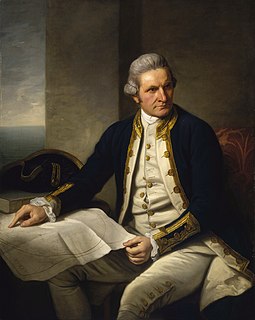
James Cook was a British explorer, navigator, cartographer, and captain in the British Royal Navy, famous for his three voyages between 1768 and 1779 in the Pacific Ocean and to New Zealand and Australia in particular. He made detailed maps of Newfoundland prior to making three voyages to the Pacific, during which he achieved the first recorded European contact with the eastern coastline of Australia and the Hawaiian Islands, and the first recorded circumnavigation of New Zealand.
Orion may refer to:
Titan most often refers to:
Venus is a planet in the Solar System.
Columbia may refer to:

HMS Endeavour was a British Royal Navy research vessel that Lieutenant James Cook commanded to Australia and New Zealand on his first voyage of discovery from 1768 to 1771.

His or Her Majesty's Ship, abbreviated HMS and H.M.S., is the ship prefix used for ships of the navy in some monarchies. Derived terms such as HMAS and equivalents in other languages such as SMS are used.
Guardian usually refers to:
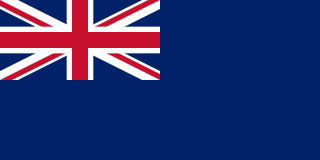
The Blue Ensign is a flag, one of several British ensigns, used by certain organisations or territories associated or formerly associated with the United Kingdom. It is used either plain or defaced with a badge or other emblem.
Intrepid, Intrepida, Intrepide, Intrepido, or similar, may refer to:
A griffin is a mythological creature with the body of a lion and head and wings of an eagle.

The Australian National Maritime Museum (ANMM) is a federally operated maritime museum in Darling Harbour, Sydney. After considering the idea of establishing a maritime museum, the federal government announced that a national maritime museum would be constructed at Darling Harbour, tied into the New South Wales state government's redevelopment of the area for the Australian bicentenary in 1988. The museum building was designed by Philip Cox, and although an opening date of 1988 was initially set, construction delays, cost overruns, and disagreements between the state and federal governments over funding responsibility pushed the opening to 1991.
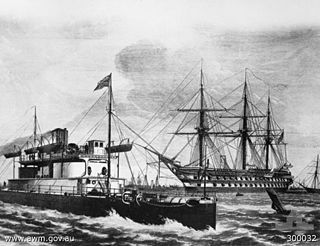
Before Federation in 1901 five of the six separate colonies maintained their own naval forces for defence. The colonial navies were supported by the ships of the Royal Navy's Australian Station which was established in 1859. The separate colonies maintained control over their respective navies until 1 March 1901, when the Commonwealth Naval Forces was created.

Robert Louis Behnken is a NASA astronaut, engineer, and former Chief of the Astronaut Office. Behnken holds a Ph.D in mechanical engineering and the rank of colonel in the U.S. Air Force, where he served before joining NASA in 2000. He flew aboard Space Shuttle missions STS-123 (2008) and STS-130 (2010) as a mission specialist, accumulating over 708 hours in space, including 55 hours of spacewalk time. He is married to fellow astronaut K. Megan McArthur.
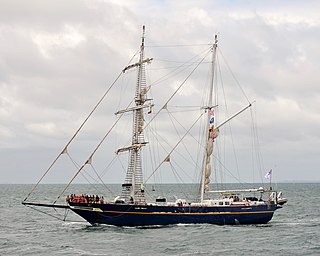
STS Young Endeavour is an Australian tall ship. Built by Brooke Marine, Young Endeavour was given to Australia by the British government in 1988, as a gift to celebrate Australian Bicentenary. Although operated and maintained by the Royal Australian Navy, Young Endeavour delivers up to twenty youth development sail training voyages to young Australians aged 16 – 23 each year. Navy personnel staff the ship and the Young Endeavour Youth Scheme coordinate the voyage program.
HMNZS Waikato (F55) was a Leander Batch 2TA frigate of the Royal New Zealand Navy (RNZN). She was one of two Leanders built for the RNZN, the other being the Batch 3 HMNZS Canterbury. These two New Zealand ships relieved British ships of the Armilla patrol during the Falklands conflict, freeing British ships for deployment.
Jupiter is a planet in the Solar System, named after Jupiter, the chief god in Roman mythology.
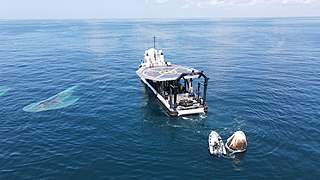
Crew Dragon Demo-2 was the first crewed test flight of the Crew Dragon spacecraft. The spacecraft, named Endeavour, launched on 30 May 2020 on a Falcon 9 Booster, and carried NASA astronauts Douglas Hurley and Robert Behnken to the International Space Station in the first crewed orbital spaceflight launched from the United States since the final Space Shuttle mission in 2011, and the first ever operated by a commercial provider. Demo-2 was also the first two-person orbital spaceflight launched from the United States since STS-4 in 1982. Demo-2 completed the validation of crewed spaceflight operations using SpaceX hardware and received human-rating certification for the spacecraft, including astronaut testing of Crew Dragon capabilities on orbit.